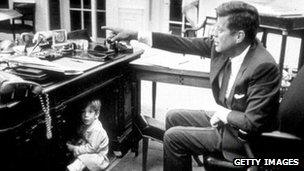Final JFK White House recordings released
- Published

The final set of recordings include the president introducing his children to the Russian foreign minister
President John F Kennedy's presidential library has released the final 45 hours of his private recordings, representing the last months of Kennedy's life.
The tapes, external include discussions on the growing conflict in Vietnam and plans for the 1964 election.
Kennedy recorded many of his White House meetings secretly, keeping their existence away from top aides.
The library has declassified and released portions of the tapes since 1993.
Among the conversations recorded is Kennedy discussing his ill-fated trip to Dallas, Texas in November 1963, and what would become the day of his funeral.
"Monday?" he asks during a discussion about scheduling. "Well that's a tough day."
"It's a hell of a day, Mr President," a staffer replies.
Two Vietnams
"Although on the one hand releasing the final recordings is a bittersweet milestone, on the other, we hope that the public will appreciate having the opportunity to hear these important discussions first hand," Maura Porter, the library's archivist, said in a statement.
She told the Associated Press news agency that Kennedy may have been saving the tapes for a potential memoir.
Another possible reason for making the tapes was Kennedy's concern that US military leaders had given a different public account of a discussion over the botched Bay of Pigs invasion.
In a meeting between Kennedy and advisers, external about developments in South Vietnam, the president seems both frustrated and amused that his military and diplomatic advisors haven given him contradictory reports on the state of the country.
General Victor Krulak reported "the Viet Cong war will be won" with the US military and social programmes in place in the country at that time.
Meanwhile, state department advisor Joseph Mendenhall told the president that many in the South Vietnamese government considered the war against the Viet Cong "secondary" to concerns about the regime in Saigon, and that student groups were considering moving to Viet Cong's side.
"You both went to the same country?" Kennedy asks.
The final set of secret recordings of President John F. Kennedy have been made public
By November 1963 Kennedy's mind was already focussing on the 1964 presidential election that he would not live to campaign in. As the incumbent, he worried about how to bring young voters to the Democratic Party.
"The younger people, party label - what is it that's going to make them go for us," Kennedy asks, external. "What is it we have to sell them? We hope we have to sell them prosperity but for the average guy, the prosperity is nil... And the people who really are well off, hate our guts."
There is also discussion about the impact of filming the Democratic convention in colour, even when most TV viewers would still see it in black and white.
"I don't know if maybe they'd come over the NBC one in colour," he says, external. "Probably a million watching it in colour and it would have an effect... Be quite an effect on the convention. The colour is so damn good. If you do it right."
Kennedy made over 260 hours of recordings of both meetings and telephone conversations during almost three years in office.
Of the final hours of recordings released on Tuesday, Ms Porter said officials excised about five to 10 minutes of family-related discussions and about 30 minutes because of national security concerns.
- Published14 September 2011
- Published13 January 2011
- Published17 January 2011